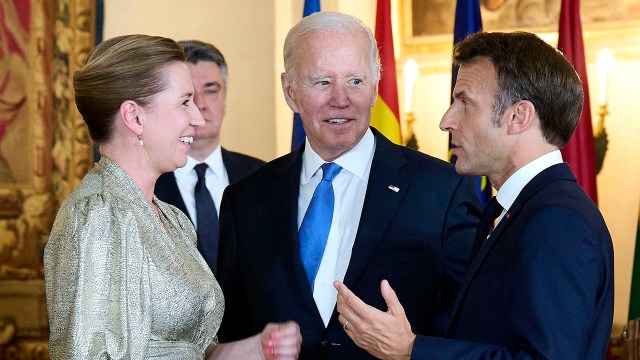
For over 20 years, Pew Research Center has tracked international public opinion of world leaders, including the U.S. president. In his second year in office, Joe Biden receives generally positive ratings in the countries surveyed by the Center. In most of these places, Biden’s ratings are higher than those of his predecessor in the White House, Donald Trump, but lower than his own ratings in 2021.
Here are six charts on what people in surveyed countries think of Biden, based on polls conducted in each nation in the spring of 2022.
This Pew Research Center analysis focuses on opinion of President Joe Biden in 19 countries, including the United States. For non-U.S. data, this post draws on nationally representative surveys of 20,944 adults from Feb. 14 to June 3, 2022. All surveys were conducted over the phone with adults in Canada, Belgium, France, Germany, Greece, Italy, the Netherlands, Spain, Sweden, the United Kingdom, Japan, Malaysia, Singapore and South Korea. Surveys were conducted face to face in Hungary, Poland and Israel and online in Australia.
In the U.S., we surveyed 3,581 adults from March 21 to 27, 2022. Everyone who took part in the U.S. survey is a member of the Center’s American Trends Panel (ATP), an online survey panel that is recruited through national, random sampling of residential addresses. This way nearly all adults have a chance of selection. The survey is weighted to be representative of the U.S. adult population by gender, race, ethnicity, partisan affiliation, education and other categories.
Here are the questions used for this analysis, along with responses. Visit our methodology database for more information about the survey methods outside the U.S. For respondents in the U.S., read more about the ATP’s methodology.

A median of 58% of adults across 18 countries say they have confidence in Joe Biden to do the right thing regarding world affairs.
Confidence in Biden varies widely by region and country. In Europe alone, the share of adults who offer a positive rating of Biden ranges from 82% in Poland to just under a third (31%) in Hungary. In the Asia-Pacific region, South Korea and Japan stand out with 70% and 62% of adults, respectively, saying they have confidence in the U.S. president. Opinion is more divided in Malaysia, Australia and Singapore.
In Israel, six-in-ten adults say they have confidence in Biden, though fewer than half attach positive descriptors to him like “strong leader” (41% say this about him), “caring about ordinary people” (36%) and “charismatic” (27%).
Confidence in Biden has dropped significantly in most places surveyed in 2021 and 2022. The share of adults who have confidence in Biden on the world stage has decreased by double digits in 13 of the 14 countries surveyed in both years. In Italy, Greece, Spain and Singapore, half or more now have little or no confidence in the U.S. president. Still, in most places – including key European countries – confidence in Biden remains higher than confidence in Trump. Israel is the one exception: While 60% of Israelis have confidence in Biden, 71% said the same about Trump in 2019.
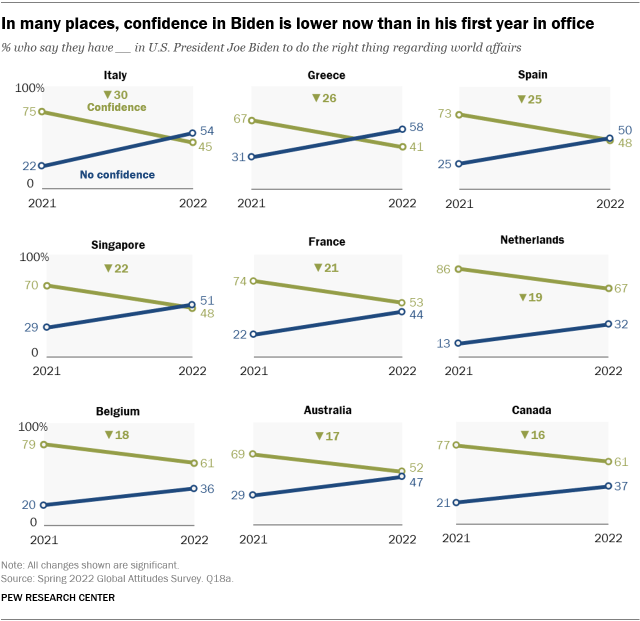
Older adults generally have more confidence in Biden than younger adults. In most countries surveyed, adults ages 50 and older are more likely than those ages 18 to 29 to have confidence in Biden. For example, nearly three-quarters of Belgians ages 50 and older give Biden positive ratings on the world stage, compared with roughly half of Belgians ages 18 to 29. Double-digit differences also exist in Germany, Canada, the Netherlands, Spain, Australia, South Korea, Sweden, Japan and France.
In Hungary, Italy and Poland, the opposite pattern appears: Younger adults are more likely than older adults to have confidence in Biden.
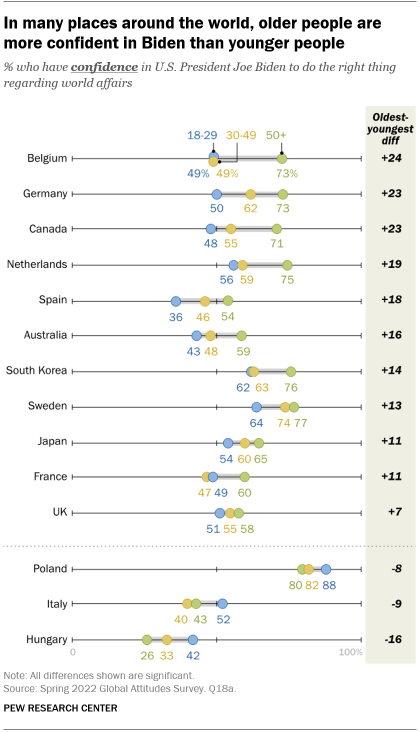
There is more public approval than disapproval of Biden’s choice to withdraw all U.S. troops from Afghanistan – but low ratings of the withdrawal itself. A median of 52% of adults across 18 countries surveyed say it was the right decision to withdraw all U.S. troops from Afghanistan, while 39% say it was the wrong decision. Responses vary by region, and in Poland, Israel, Japan and Hungary, roughly two-in-ten do not offer a response.
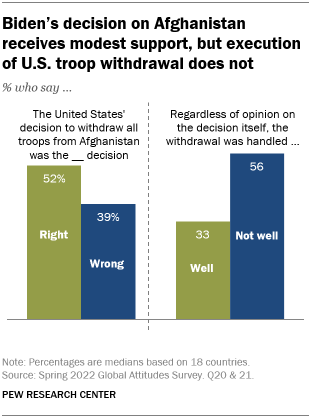
Across all 18 countries, a median of just a third of adults (33%) say the withdrawal was handled well. Far more (median of 56%) say it was not handled well.
Americans’ views of the decision to withdraw troops, as well as the execution of the plan, are largely aligned with views from around the world. Six-in-ten Americans say it was the right decision, while 38% hold the opposite view. And roughly a third (32%) say the withdrawal was handled well, whereas two-thirds (66%) say it was not.
In places where the U.S. is seen more favorably, so is Biden. For example, the two countries surveyed where people have the most favorable views of the United States – Poland and South Korea – are also among the countries where people have the most confidence in Biden.
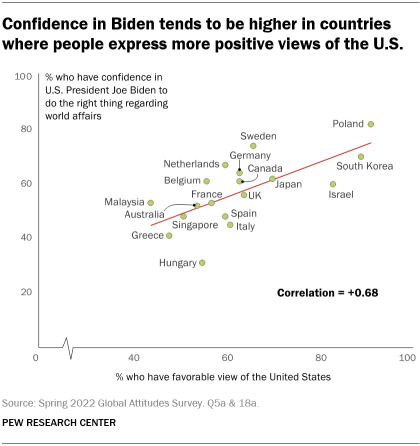
In nearly all countries surveyed, more people express a favorable view of the U.S. than confidence in Biden – though the opposite is true in the Netherlands, Sweden, Belgium and Malaysia. In Germany and Australia, the share of adults with a positive view of the U.S. and confidence in Biden are roughly the same. This pattern holds at the individual level as well: Favorable views of the U.S. correlate with positive ratings of Biden.
Confidence in Biden is similar to confidence in other Western leaders. A median of 58% of adults across the 18 surveyed countries have confidence in Biden’s handling of global affairs, just a few points lower than the median share who say the same about French President Emmanuel Macron (61%) and equal to positive ratings of German Chancellor Olaf Scholz (58%). Larger shares, however, say they are not confident in Biden than say the same of his German counterpart.
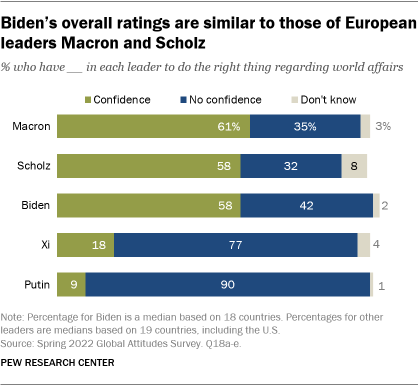
Within specific countries, there are greater differences in ratings of the three leaders. In Poland and Israel, for instance, larger shares are more confident in Biden than either of his European counterparts, while in Greece, it is Macron who receives the highest ratings.
Note: Here are the questions used for this analysis, along with responses and the full dataset. Visit our methodology database for more information about the survey methods outside the U.S. For respondents in the U.S., read more about the ATP’s methodology.
